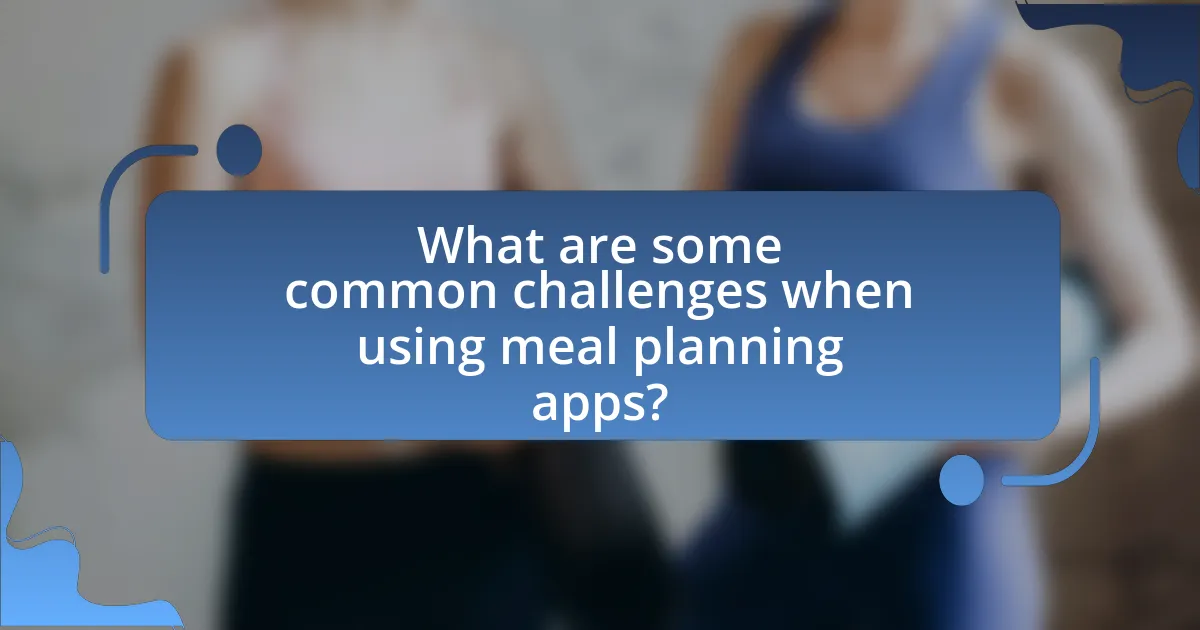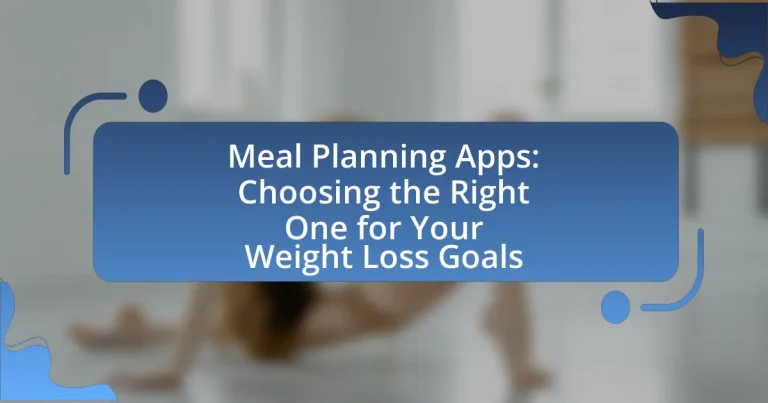Meal planning apps are digital tools designed to assist users in organizing meals, tracking nutritional intake, and creating shopping lists, which can significantly support weight loss efforts. These apps offer customizable meal plans tailored to individual dietary preferences and caloric goals, promoting healthier food choices and portion control. Key features to consider when selecting a meal planning app include nutritional tracking, grocery list generation, and user-friendly interfaces, all of which enhance the effectiveness of meal planning in achieving weight loss objectives. The article also discusses the psychological benefits of meal planning, common challenges users may face, and strategies for maintaining motivation and adapting meal plans to changing dietary needs.

What are Meal Planning Apps and How Can They Help with Weight Loss?
Meal planning apps are digital tools designed to help users organize their meals, track nutritional intake, and create shopping lists, which can significantly aid in weight loss. These apps provide personalized meal plans based on dietary preferences and caloric goals, making it easier for individuals to adhere to a structured eating regimen. Research indicates that individuals who engage in meal planning are more likely to consume healthier foods and maintain portion control, which are critical factors in successful weight management. For instance, a study published in the Journal of the Academy of Nutrition and Dietetics found that meal planning is associated with improved dietary quality and reduced obesity risk.
What features should you look for in a meal planning app?
A meal planning app should include features such as customizable meal plans, nutritional tracking, grocery list generation, recipe suggestions, and integration with fitness apps. Customizable meal plans allow users to tailor their diet according to personal preferences and dietary restrictions, which is essential for effective weight loss. Nutritional tracking helps users monitor their calorie intake and macronutrient distribution, supporting informed dietary choices. Grocery list generation simplifies shopping by organizing ingredients needed for planned meals, enhancing convenience. Recipe suggestions based on available ingredients or dietary goals can inspire users to try new meals, promoting variety in their diet. Integration with fitness apps enables users to align their meal planning with their exercise routines, creating a holistic approach to weight management. These features collectively enhance the user experience and effectiveness of meal planning apps in achieving weight loss goals.
How do these features support weight loss goals?
Meal planning apps support weight loss goals by providing structured meal options, tracking caloric intake, and promoting healthier food choices. These features enable users to create personalized meal plans that align with their dietary preferences and caloric needs, facilitating better adherence to weight loss strategies. Research indicates that individuals who engage in meal planning are more likely to consume fewer calories and make healthier food selections, which directly contributes to weight loss success. For instance, a study published in the Journal of Nutrition Education and Behavior found that meal planning is associated with improved dietary quality and weight management outcomes.
What role does user interface play in the effectiveness of meal planning apps?
User interface plays a crucial role in the effectiveness of meal planning apps by directly influencing user engagement and satisfaction. A well-designed user interface enhances usability, allowing users to navigate the app easily, input data efficiently, and access meal plans without frustration. Research indicates that apps with intuitive interfaces lead to higher user retention rates; for instance, a study published in the Journal of Medical Internet Research found that user-friendly design significantly improved adherence to dietary plans among participants. Thus, the effectiveness of meal planning apps is largely dependent on how effectively the user interface facilitates a seamless and enjoyable user experience.
Why is meal planning important for weight loss?
Meal planning is important for weight loss because it helps individuals control their calorie intake and make healthier food choices. By planning meals in advance, individuals can ensure they have balanced nutrition, avoid impulsive eating, and reduce the likelihood of consuming high-calorie, unhealthy foods. Research indicates that people who engage in meal planning are more successful in achieving their weight loss goals, as it promotes consistency and accountability in dietary habits.
How does meal planning contribute to healthier eating habits?
Meal planning contributes to healthier eating habits by promoting intentional food choices and portion control. When individuals plan their meals, they are more likely to include a variety of nutritious foods, which can lead to a balanced diet. Research indicates that people who engage in meal planning consume more fruits and vegetables, and have a lower intake of processed foods, which is associated with better overall health outcomes. For example, a study published in the Journal of Nutrition Education and Behavior found that meal planning is linked to improved dietary quality and reduced food waste, reinforcing the positive impact of structured eating habits on health.
What psychological benefits does meal planning provide for weight loss?
Meal planning provides significant psychological benefits for weight loss by enhancing self-efficacy and reducing decision fatigue. When individuals engage in meal planning, they gain a sense of control over their food choices, which boosts their confidence in adhering to a weight loss regimen. Research indicates that structured meal planning can lead to improved dietary adherence, as it minimizes impulsive eating and promotes healthier food selections. A study published in the Journal of Nutrition Education and Behavior found that individuals who planned their meals were more likely to consume a balanced diet and achieve their weight loss goals compared to those who did not plan. This structured approach not only fosters a positive mindset but also helps individuals develop healthier habits, reinforcing their commitment to weight loss.

How do you choose the right meal planning app for your needs?
To choose the right meal planning app for your needs, first identify your specific dietary goals, such as weight loss, meal variety, or nutritional tracking. Next, evaluate apps based on features like recipe databases, grocery list generation, and integration with fitness trackers. For instance, apps like MyFitnessPal offer extensive food databases and calorie tracking, which can support weight loss efforts effectively. Additionally, consider user reviews and ratings to assess usability and satisfaction, as apps with higher ratings often indicate better user experiences.
What are the top meal planning apps available for weight loss?
The top meal planning apps available for weight loss include MyFitnessPal, Lose It!, and Noom. MyFitnessPal offers a comprehensive food database and calorie tracking features, making it effective for weight loss management. Lose It! focuses on personalized weight loss plans and easy food logging, which helps users stay on track with their goals. Noom combines meal planning with behavioral psychology to encourage sustainable weight loss habits. These apps have been widely recognized for their effectiveness in helping users achieve weight loss through structured meal planning and tracking.
What unique features do these apps offer?
Meal planning apps offer unique features such as personalized meal recommendations based on dietary preferences, calorie tracking, and integration with grocery delivery services. These features enhance user experience by allowing individuals to tailor their meal plans to specific weight loss goals, track their nutritional intake effectively, and simplify the grocery shopping process. For instance, apps like MyFitnessPal provide extensive food databases and barcode scanning for easy logging, while others like Mealime focus on quick recipe generation based on available ingredients.
How do user reviews and ratings influence app selection?
User reviews and ratings significantly influence app selection by providing potential users with insights into the app’s functionality, reliability, and user satisfaction. Research indicates that 79% of consumers trust online reviews as much as personal recommendations, highlighting the importance of social proof in decision-making. High ratings and positive reviews can enhance an app’s visibility in app stores, leading to increased downloads, while negative feedback can deter users from selecting that app. Furthermore, specific feedback in reviews often addresses features relevant to meal planning, such as ease of use, recipe variety, and integration with dietary goals, which are crucial for users focused on weight loss.
How can you evaluate the effectiveness of a meal planning app?
To evaluate the effectiveness of a meal planning app, assess its ability to meet user goals, such as weight loss or dietary adherence. Key metrics include user engagement, meal variety, nutritional balance, and ease of use. Research indicates that apps promoting structured meal plans can lead to a 50% increase in adherence to dietary goals, as shown in a study published in the Journal of Medical Internet Research. Additionally, user feedback and ratings can provide insights into the app’s practical effectiveness in real-world scenarios.
What metrics should you track to measure success?
To measure success in meal planning apps for weight loss goals, track metrics such as weight change, calorie intake, meal adherence, and nutrient balance. Weight change provides a direct indication of progress towards weight loss goals, while calorie intake helps ensure users are in a caloric deficit, which is essential for weight loss. Meal adherence measures how consistently users follow their meal plans, and nutrient balance ensures that users are receiving adequate vitamins and minerals, contributing to overall health. These metrics collectively provide a comprehensive view of the effectiveness of meal planning apps in achieving weight loss objectives.
How can you adjust your meal planning strategy based on app feedback?
To adjust your meal planning strategy based on app feedback, analyze the insights provided by the app regarding your dietary preferences, nutritional intake, and meal frequency. For instance, if the app indicates that you are consistently exceeding your calorie goals, you can modify your meal choices to include lower-calorie options or adjust portion sizes. Additionally, if feedback highlights a lack of variety in your meals, you can incorporate new recipes or ingredients to enhance diversity. Research shows that personalized meal planning, informed by user data, can lead to better adherence to dietary goals and improved weight loss outcomes.

What are some common challenges when using meal planning apps?
Common challenges when using meal planning apps include difficulty in customizing meal plans to individual dietary needs, limited database of recipes, and user interface complexities that can hinder navigation. Many users find that apps do not adequately accommodate specific dietary restrictions, such as allergies or preferences, leading to frustration. Additionally, some meal planning apps may have a restricted selection of recipes, which can limit variety and creativity in meal preparation. User interface issues, such as complicated layouts or unclear instructions, can also make it challenging for users to effectively utilize the app’s features, ultimately impacting their meal planning experience.
How can you overcome obstacles in meal planning?
To overcome obstacles in meal planning, individuals can utilize meal planning apps that streamline the process and provide personalized meal suggestions. These apps often include features such as grocery lists, nutritional tracking, and customizable meal options, which help users stay organized and focused on their weight loss goals. Research indicates that using technology for meal planning can lead to better dietary adherence and improved weight management outcomes, as evidenced by a study published in the Journal of Nutrition Education and Behavior, which found that participants using meal planning apps reported higher satisfaction and success in achieving their dietary goals.
What strategies can help maintain motivation while using meal planning apps?
To maintain motivation while using meal planning apps, users should set specific, achievable goals and track their progress. Establishing clear objectives, such as preparing a certain number of healthy meals each week, provides direction and a sense of accomplishment. Additionally, utilizing features within the app, such as reminders and notifications, can help users stay engaged and accountable. Research indicates that goal-setting and self-monitoring are effective strategies for enhancing motivation in dietary behavior change (Locke & Latham, 2002). By regularly reviewing their progress and celebrating small victories, users can reinforce their commitment to meal planning and ultimately support their weight loss goals.
How can you adapt meal plans to fit changing dietary needs?
To adapt meal plans to fit changing dietary needs, one must regularly assess individual health conditions, preferences, and nutritional requirements. This involves monitoring any changes in health status, such as allergies, intolerances, or medical conditions that may necessitate dietary adjustments. For instance, if a person develops lactose intolerance, substituting dairy products with lactose-free alternatives is essential. Additionally, utilizing meal planning apps can facilitate this process by providing customizable options that align with specific dietary restrictions, such as gluten-free or low-carb diets. Research indicates that personalized meal planning can enhance adherence to dietary guidelines, thereby improving overall health outcomes.
What tips can enhance your experience with meal planning apps?
To enhance your experience with meal planning apps, prioritize selecting an app that aligns with your dietary preferences and goals. Research indicates that users who choose apps tailored to their specific needs, such as calorie tracking or dietary restrictions, report higher satisfaction and better adherence to meal plans. Additionally, utilizing features like grocery list integration and recipe suggestions can streamline the planning process, making it more efficient and enjoyable. Studies show that apps with user-friendly interfaces and customizable options lead to increased engagement and better outcomes in meal planning.
How can you integrate meal planning into your daily routine effectively?
To integrate meal planning into your daily routine effectively, allocate a specific time each week to plan meals and create a shopping list. This structured approach allows for organized grocery shopping and ensures that meals align with dietary goals. Research indicates that individuals who engage in weekly meal planning are more likely to adhere to healthy eating patterns, as it reduces impulsive food choices and promotes balanced nutrition. By consistently dedicating time to this practice, you can streamline your cooking process and enhance your overall dietary compliance.
What are best practices for maximizing the benefits of meal planning apps?
To maximize the benefits of meal planning apps, users should consistently input their dietary preferences and restrictions to receive tailored meal suggestions. This practice ensures that the app generates meal plans that align with individual health goals, such as weight loss or dietary needs. Additionally, users should regularly update their meal plans based on seasonal ingredients and personal schedules, which enhances variety and adherence to the plan. Research indicates that personalized meal planning can lead to better dietary adherence and improved health outcomes, as evidenced by a study published in the Journal of Nutrition Education and Behavior, which found that individuals who used meal planning tools reported higher fruit and vegetable intake.


